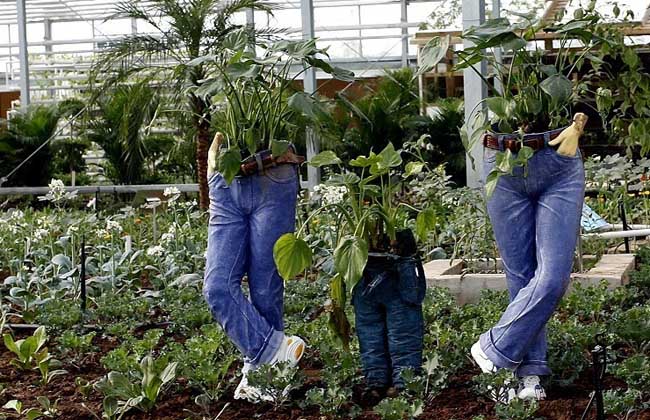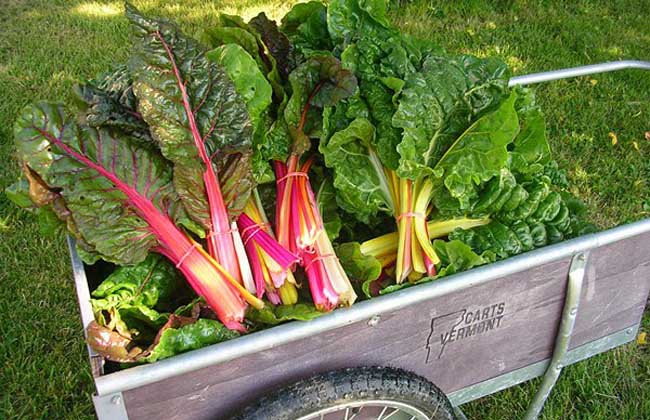What are the types of agricultural regions?
Abstract: agriculture is an industry that uses the laws of the growth and development of animals and plants to obtain products through artificial cultivation. Due to the different regional distribution of animals and plants and the regional differences in natural and socio-economic conditions, the world has formed a relatively stable and regional variety of agricultural regional types in a certain region. Let's take a look at the agricultural regional types.

Agriculture is an industry that makes use of the laws of the growth and development of animals and plants to obtain products through artificial cultivation. Due to the different regional distribution of animals and plants and the regional differences in natural and socio-economic conditions, the world has formed a relatively stable and regional variety of agricultural regional types in a certain region. Let's take a look at the agricultural regional types.
Tropical rainforest migration agriculture
Migration agriculture is an ancient and primitive mode of agricultural production, which has no fixed farmland, and the cultivated land is chosen in areas with lush forests and grasslands. Farmers clear a piece of land in the forest through cutting and burning. Grow crops in the original way. When the soil fertility of this land declines and plants can no longer grow, farmers give it up to develop another piece of land, so it is called migration agriculture, which is easy to cause soil erosion and lead to the destruction of ecological balance.
Rice planting industry
Rice planting is a unique type of agriculture in the humid tropics and subtropics, which is mainly concentrated in the monsoon areas of East Asia, Southeast Asia and South Asia and the tropical rain forest areas of Southeast Asia. it is a kind of intensive agriculture that requires a lot of labor. The rice planting industry in Asia has the following characteristics: first, the operation of small farmers; second, high output per unit area but low commodity rate; third, low level of mechanization; fourth, large quantity of water conservancy projects; and fifth, low level of science and technology. The solution is to increase investment in science and technology and appropriately expand the planting scale.
Plantation agriculture
Plantation agriculture is a large-scale intensive commodity agriculture growing a single cash crop in the tropics, which is widely distributed in Latin America, Southeast Asia, South Asia and sub-Saharan Africa. Although the production form of the state-owned rubber farm in Hainan Island is similar to that of the plantation, the nature, scale and management mode of the rubber farm are very different from those of the plantation. Plantation agriculture is often engaged in large-scale production, the garden has a complete set of production and living facilities, many plantations not only have agriculture and transport machinery, there are also the park's road system, agricultural products processing plant, agricultural machinery maintenance factory, power supply and water supply, as well as education and sanitation facilities.
Commercial grain agriculture
Commercial grain agriculture is the main regional type of commercial grain production in the world, and it is a market-oriented agricultural type, with wheat and corn as the main crops. The main distribution areas are the United States, Canada, Argentina, Australia, Russia, Ukraine and other countries, the commodity grain agriculture in these countries is generally family-run, while China's is generally state-run. Abstract: agriculture is an industry that uses the laws of the growth and development of animals and plants to obtain products through artificial cultivation. Due to the different regional distribution of animals and plants and the regional differences in natural and socio-economic conditions, the world has formed a relatively stable and regional variety of agricultural regional types in a certain region. Let's take a look at the agricultural regional types.
Ranching and grazing
Pasture grazing is a kind of agricultural regional type for large-scale commercial animal husbandry production. This kind of agriculture is often distributed in arid and semi-arid climate areas, the land is vast and sparsely populated, and the surface is mainly grassland vegetation. as a result, the agricultural regional type of ranching has been formed, which is mainly distributed in the United States, Australia, New Zealand, Argentina, South Africa and other countries and regions.
Dairy industry
Dairy industry is a market-oriented agricultural regional type that comes into being with the development of the city. its production object is dairy cows, and its products are mainly milk and its products, such as milk powder, butter and cheese. the distance of the market and the supply of feed are two important factors that affect the production of dairy industry. The dairy industry in the world is mainly distributed around the Great Lakes in North America, Western Europe, Central Europe, Australia and New Zealand. Dairy industry has also been developed around big cities such as Beijing and Shanghai in China, and the products are mainly fresh milk.
Mixed agriculture
Mixed agriculture is a regional type of agricultural production that organically combines planting and animal husbandry in the same farm, with various forms, but with stable production forms, wide distribution and a certain scale of commodity production. Only grain and livestock mixed agriculture in economically developed countries, so the so-called mixed agriculture usually refers to grain and animal husbandry mixed agriculture. The main distribution areas are Europe, North America, South Africa, Australia and New Zealand. The foundation pond production in the Pearl River Delta in China is a novel mixed agriculture.
Nomadic husbandry
Nomadic animal husbandry refers to a kind of self-sufficient agriculture based on grazing livestock, which is a typical extensive agriculture. This mode of production is suitable for arid climate areas where it is difficult to settle agriculture. Abstract: agriculture is an industry that uses the laws of the growth and development of animals and plants to obtain products through artificial cultivation. Due to the different regional distribution of animals and plants and the regional differences in natural and socio-economic conditions, the world has formed a relatively stable and regional variety of agricultural regional types in a certain region. Let's take a look at the agricultural regional types.
Horticulture industry
Horticulture is a commercial agriculture that provides vegetables, fruits and flowers for cities. The rise and development of this kind of agriculture is related to the acceleration of urbanization in the modern world. Farmers engaged in horticulture practice intensive and specialized production. Some of them only produce vegetables, and some even produce only one special-purpose product. This kind of agriculture is generally distributed around big cities. Later, with the development of transportation and fresh-keeping technology, horticulture has also been developed in areas far away from cities but with suitable climatic conditions.
Grain and livestock agriculture
Cereal and livestock agriculture is a type of agriculture that combines dry grain cultivation with livestock farming, which is basically concentrated in Asia, including the north and northeast of China, the plateau areas of Indochina, the southern plateau and western regions of India, Pakistan and Afghanistan, and the vicinity of the two river basins in West Asia. In Africa, it is only found in the Ethiopian plateau and Lesotho and its vicinity in South Africa. Among the crops in this agricultural area, wheat is absolutely dominant, followed by barley, oats, rye, millet, sorghum, corn, potatoes and other food crops, soybean occupies an important position in legume crops, and cash crops include cotton, tobacco, flax, marijuana and sugar beet. Due to the arid climate and unstable rainfall, irrigation plays a very important role in order to ensure the stability and growth of yield. In raising livestock, India and West Asia are mainly cattle and sheep, while in China, there are mainly pigs and cattle, sheep, horses, mules and donkeys in different areas. in addition to labor, livestock is also the main source of meat, skin and wool.
Mediterranean agriculture
The surrounding area along the Mediterranean is a special type of climate, where the climate is hot and dry in summer, mild and rainy in winter, precipitation is obviously inconsistent with the temperature, and crops are characterized by drought-tolerant strains. Among the crops are mainly wheat and barley, followed by oats and corn. Grapes, woody olives and figs are widely cultivated cash crops in the region. The livestock raised are sheep, goats and pigs. Therefore, the combination of drought-tolerant crops, woody cash crops and raising livestock are the characteristics of agriculture in the Mediterranean region. In Mediterranean agriculture, the production areas of agriculture, fruit trees and animal husbandry are separated from each other, the farmland for growing food crops is mostly distributed on flat land and gentle slopes, vineyards, olives and figs are mostly planted in hills, and the high slopes are places for grazing. Due to the separation of livestock grazing and agriculture in the region, barnyard manure can not be used to supplement the nutrients of farmland, farmland mostly rely on fallow to restore soil fertility.
Tropical settlement agriculture
Settlement agriculture that has gradually developed around tropical migration agriculture is called tropical settlement agriculture, which is distributed along the coast of the Gulf of Guinea in West Africa and its northern subtropical drier regions and the East African plateau, in the Andean highlands north of Bolivia in Latin America and in southern Mexico and southern Yucatan Peninsula. Compared with the tropical migratory agricultural areas near the equator, the natural conditions of this agricultural distribution area have a decrease in rainfall and temperature, and can be divided into dry and wet seasons. in topography, most of them belong to plateaus and mountainous areas and a small amount of river valleys, and the lowlands are relatively few. the leaching of soil is weak, the decomposition rate of organic matter is reduced, and the content of organic matter is more, generally speaking, the agricultural conditions are more favorable.
Related
- A course of planting techniques and methods on how to grow carrots
- How to plant the latest tulips?
- Is it better to pick tea in the morning or in the afternoon? When is the best time for tea to be picked? what is the third or fifth tea?
- Launch Yuanxiao Happy combination Haocha + Tea Yuan healthy Taste
- Penghu Tourism "Fireworks 20 Parade with You"
- 2022 West Lake Happiness holds "Digital Revitalization Voucher" and draws iphone13 and laptop.
- Banqiao Fuzhou social houses are designed to change start-up combined with police elimination to create a safe and livable environment
- The convenient measure of "mechanical weeding" in Xinbei has been abused and the Agriculture Bureau has imposed heavy penalties on the illegal land consolidation.
- Changgeng University Joins Hands with Four Memory Factories to Rescue Memory Talent Shortage
- The list of Taiwan's top 100 MVP managers is listed by the Director-General of the Farmers' Association of Sanxia District.



